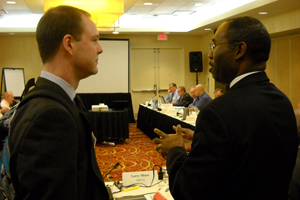FMCSA Committee Takes Early Steps on Entry-Level Driver Training

At a March 19 meeting here, the advisory committee gave priority to performance-based training over an hours-based approach, examined to whom the rule should apply, and viewed an outline of what the final product will look like.
Discussions on a curriculum for all people trying to get a commercial driver license to operate trucks or buses led to a suggestion from Larry Minor, FMCSA associate administrator for policy, to construct a highly-detailed curriculum.
LIVEONWEB: Watch replay of show focused on driver training
Setting standards based on hours to be logged by students — without their demonstrating mastery of needed skills — was soundly rejected.
Pursuing a different approach, Minor said, “Realistically, how long does it take to become proficient? It just won’t happen in 40 hours, so lay out what is needed in a curriculum in detail.”
After discussion, committee facilitator Richard Parker called for a non-binding test vote, and Minor’s suggestion, with no hours requirement attached, won strong support but fell short of a consensus. His idea was endorsed 14-6 with two abstentions, but the group members will accept only three negative votes in their definition of consensus.
Defining an entry-level driver led to intense discussion over small details. What appeared to be consensus in the February meetings when deliberations started, nearly crumbled in March.
CDL holders who let their credentials lapse for several years were the issue. A short lapse of, say, up to six months was not considered a problem. Time beyond that was an issue though.
“Are you applying for a re-instatement or a new CDL at that point,” asked Boyd Stephenson, a staff director for American Trucking Associations.
Bob Tershak, a master trooper with the Virginia State Police, led the case for more training.
“There’s no question that driving a commercial truck is incredibly difficult. There has to be some standard, whether it’s two years, three years or four,” said Tershak, who inspects commercial vehicles.
North Carolina-based owner-operator Bryan Spoon endorsed the idea of retraining, but not going back to the beginning.
“When you’re in the military you have to qualify on a weapon every year but you don’t have to go back to boot camp,” Spoon said. He suggested a “ramp up,” or refresher training module, for drivers whose CDLs have lapsed for years.
There was no formal vote on the issue, which was referred to a subcommittee, but refresher appeared to gain more support than requiring a second round of entry-level driver training.
As for the shape of the training rule, Minor suggested it become a new Section 380 in the Code of Federal Regulations. Committee members recommended some changes to the document but accepted the general idea.
One section would create a National Registry of Driver Training Programs. Minor said this would be similar to FMCSA’s web portal for certified medical examiners.
Training schools would have to demonstrate compliance with the new rule to be listed on the website. FMCSA would accept graduation certificates only from schools on the list.
March 19 was the first-half of a two-day session, and the second pair of a series of six. The first two days were in February in Arlington, Virginia, and the meetings are scheduled to conclude in late May.

